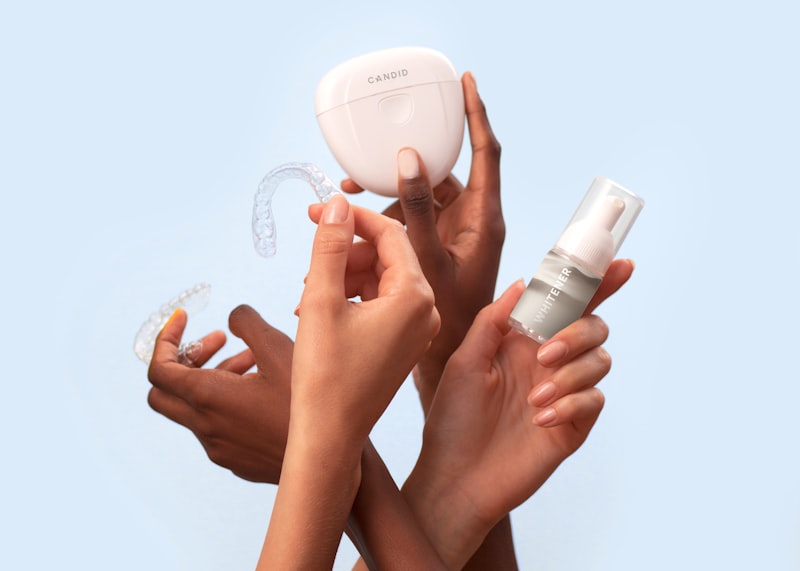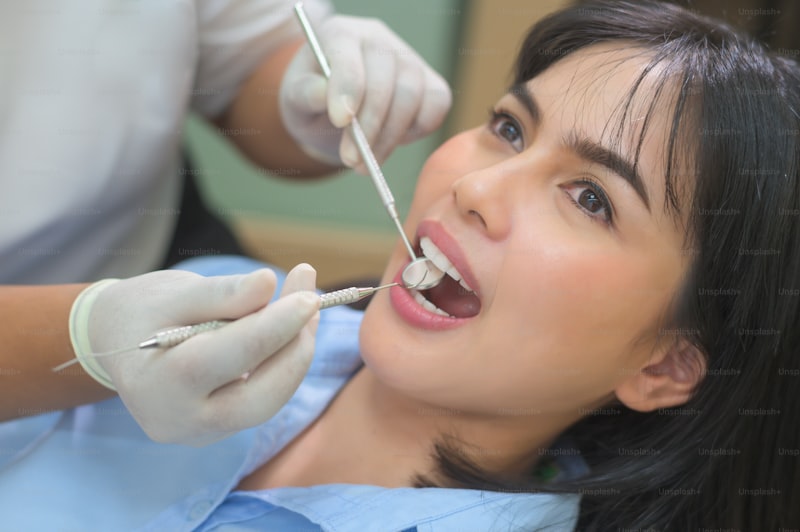Firstly, cleaning your dentures daily is essential. Just like natural teeth, dentures accumulate plaque, food particles, and bacteria. Use a soft-bristled brush designed for dentures and a mild cleanser to gently scrub them. Avoid using regular toothpaste as it can be too abrasive and damage the denture material.
It’s also important to clean your mouth thoroughly. Brush your gums, tongue, and palate with a soft toothbrush every morning before inserting your dentures. This helps remove plaque and stimulates circulation in your gums.
Additionally, remove and rinse your dentures after eating to remove food debris. Handle them carefully to avoid dropping and damaging them. When not in use, keep your dentures in water or a denture cleaning solution to prevent them from drying out and warping.
Regular dental check-ups are vital even if you wear dentures. Your dentist will examine your mouth for any signs of irritation, infection, or oral diseases. They can also professionally clean your dentures and adjust them if necessary to ensure a proper fit.
To maintain oral health with dentures, it’s important to maintain a balanced diet. Avoid sticky or hard foods that can damage your dentures or cause discomfort. Instead, opt for softer foods and chew evenly on both sides of your mouth to prevent uneven wear on your dentures.
Mastering Oral Hygiene: Essential Tips for Denture Wearers

Maintaining good oral hygiene is crucial for denture wearers to ensure both comfort and oral health. Dentures, whether full or partial, require regular care and attention to prevent issues like bad breath, gum irritation, and infections. Here are essential tips to master oral hygiene with dentures:
-
Daily Cleaning Routine: Just like natural teeth, dentures need to be cleaned daily to remove food particles and plaque. Use a soft-bristled brush specifically designed for dentures to gently brush all surfaces, including gums and tongue.
-
Use Denture Cleansers: Regular toothpaste can be abrasive and damage dentures. Instead, opt for a denture cleaner or mild dishwashing liquid to clean your dentures thoroughly. Avoid using hot water as it can warp the dentures.
-
Soak Overnight: To keep dentures moist and maintain their shape, soak them in water or a denture soaking solution overnight. This helps prevent dryness which can lead to discomfort and oral sores.
-
Handle with Care: Dentures are delicate and can break if dropped. Always handle them over a folded towel or basin of water to cushion the impact in case they slip from your hands.
-
Regular Dental Check-ups: Schedule regular visits to your dentist for check-ups and adjustments. Your dentist can ensure your dentures fit well and check for any signs of oral health issues.
-
Maintain Oral Health: Even with dentures, it’s important to maintain good oral hygiene. Brush your remaining natural teeth, gums, and tongue with a soft-bristled brush twice a day. This helps prevent oral infections and bad breath.
-
Avoid Harmful Habits: Refrain from chewing gum or eating sticky foods that can damage or dislodge your dentures. Smoking can also stain dentures and contribute to oral health problems.
-
Proper Storage: When not in use, keep your dentures in a denture soaking solution or plain water to prevent them from drying out and losing their shape.
The Ultimate Guide to Caring for Dentures and Oral Health
Cleaning dentures daily is non-negotiable. Start by rinsing them after meals to remove food particles and debris. Use a soft-bristled brush and non-abrasive denture cleaner to gently scrub all surfaces. Avoid using regular toothpaste as it can be too abrasive and may damage the denture material. Clean your mouth and gums as well to prevent plaque buildup and irritation.
Handle your dentures carefully to avoid dropping them. When not in use, store them in a denture cleaning solution or plain water to prevent them from drying out. Avoid hot water, which can cause dentures to warp.
Schedule regular dental check-ups to ensure your dentures fit well and your oral tissues are healthy. Your dentist will examine your mouth for any signs of irritation, oral infections, or changes in your gum tissue that may require adjustments to your dentures.
Even if you have full dentures, it’s important to maintain good oral hygiene. Brush your gums, tongue, and palate with a soft-bristled brush every morning before inserting your dentures. This helps stimulate circulation in your tissues and removes plaque.
Initially, eating and speaking with dentures may feel awkward. Start with soft foods cut into small pieces and chew slowly using both sides of your mouth. Practice speaking by reading aloud and repeating difficult words to improve your pronunciation and speech clarity.
If your dentures become loose, cause discomfort, or break, contact your dentist immediately for adjustments or repairs. Avoid trying to fix them yourself, as this can cause further damage.
Caring for dentures and maintaining good oral health requires diligence and regular attention. By following these tips and staying proactive with your dental care, you can ensure your dentures fit well, feel comfortable, and contribute to your overall health and well-being.
Pro Tips: Keeping Your Smile Bright with Dentures
First off, cleaning is key. Just like natural teeth, dentures require regular cleaning to stay bright and free from stains. Use a soft-bristled brush designed specifically for dentures and a non-abrasive denture cleaner to gently remove food particles and plaque. Avoid using regular toothpaste as it can be too harsh and abrasive for denture materials.
Secondly, proper soaking is crucial. Dentures should be soaked overnight in a denture solution or water to keep them moist and maintain their shape. This also helps in reducing bacteria buildup. Remember to rinse your dentures thoroughly before putting them back in your mouth to avoid any residue from the soaking solution.
Another pro tip is handling with care. Dentures are delicate and can break if mishandled. When cleaning or handling your dentures, fill the sink with water or place a towel down to cushion any accidental drops. This simple precaution can save you from the hassle and cost of denture repairs or replacements.
Moreover, regular dental check-ups are essential. Even with dentures, it’s important to visit your dentist regularly for oral exams and professional cleanings. Your dentist can ensure that your dentures fit properly and check for any signs of oral health issues that may arise.
Additionally, maintaining oral hygiene is still important. Brush your gums, tongue, and palate with a soft-bristled brush every morning before inserting your dentures. This helps stimulate circulation in your tissues and remove plaque.
Lastly, be mindful of what you eat. While dentures are designed to withstand chewing forces, it’s best to avoid overly sticky or hard foods that can damage them. Cut your food into smaller pieces and chew evenly on both sides of your mouth to prevent uneven pressure on your dentures.
Daily Habits for Healthy Gums and Dentures
Brushing twice a day forms the cornerstone of good oral hygiene. Use a soft-bristled toothbrush and fluoride toothpaste to gently clean your teeth and gums. This not only removes plaque but also prevents gum disease and decay.
Flossing is another essential habit often overlooked. It reaches areas between teeth and along the gumline where your toothbrush can’t reach, removing food particles and plaque buildup. Incorporate flossing into your daily routine to maintain healthy gums and prevent cavities.
Rinsing with mouthwash helps in several ways. It can freshen your breath, reduce plaque, and fight gum disease. Choose an alcohol-free mouthwash with fluoride for added protection without drying out your mouth.
Eating a balanced diet rich in vitamins and minerals is beneficial not only for your overall health but also for your oral health. Avoid sugary snacks and drinks that can contribute to tooth decay. Opt for crunchy fruits and vegetables that naturally clean teeth and stimulate gum health.
Regular visits to your dentist are crucial. Professional cleanings and check-ups help detect early signs of gum disease, cavities, or other dental issues. Your dentist can provide personalized advice and treatments to keep your gums and dentures in optimal condition.
Incorporating these daily habits into your routine can promote healthy gums and ensure your dentures stay in excellent shape. Consistency is key in maintaining oral health, so make these habits a part of your daily life for a confident smile and overall well-being.
Expert Advice: Maintaining Oral Health Beyond Natural Teeth
Maintaining oral health goes beyond just caring for your natural teeth. As dental technology advances and more people opt for dental implants, bridges, and dentures, understanding how to care for these replacements is crucial for long-term oral health.
One of the most important aspects of maintaining oral health with dental implants or other prosthetics is regular oral hygiene. Just like natural teeth, implants and bridges can accumulate plaque and bacteria that can lead to gum disease and other oral health issues. Brushing at least twice a day and flossing daily are essential habits to prevent plaque buildup and maintain the health of both natural teeth and prosthetic replacements.
Additionally, visiting your dentist regularly is vital. Dental check-ups allow your dentist to assess the health of your gums, check the stability of your implants or dentures, and detect any potential issues early on. Professional cleanings also help remove stubborn plaque and tartar that regular brushing and flossing might miss.
Another expert tip for maintaining oral health with prosthetics is to avoid harmful habits. Chewing hard objects, using your teeth as tools, and smoking can all damage both natural teeth and dental implants or dentures. Protecting your oral health means being mindful of these habits and making adjustments where necessary.
Lastly, maintaining a balanced diet contributes significantly to oral health. Eating nutrient-rich foods promotes healthy gums and strong teeth, which is beneficial whether you have natural teeth or prosthetic replacements.
Caring for oral health beyond natural teeth involves consistent oral hygiene practices, regular dental visits, avoiding harmful habits, and maintaining a healthy diet. By following these expert tips, you can ensure the longevity and health of your dental implants, bridges, or dentures, supporting your overall oral well-being for years to come.
Best Practices: Cleaning and Maintaining Dentures Effectively
Maintaining dentures isn’t just about keeping them clean; it’s about ensuring they stay comfortable and last longer. Proper care not only enhances their lifespan but also keeps your oral health in check. Let’s delve into the best practices for cleaning and maintaining dentures effectively.
Cleaning your dentures daily is crucial to prevent plaque buildup and stains. Start by rinsing them under running water to remove any food particles. Use a soft-bristled brush and a mild denture cleaner to gently scrub all surfaces, including the grooves where food can accumulate. Avoid using regular toothpaste as it may be too abrasive and can scratch the denture surface.
To keep dentures moist and prevent them from drying out, soak them in water or a denture cleaning solution overnight. This step is vital as it helps maintain the shape of your dentures and keeps them fresh for use the next day. Follow the manufacturer’s instructions for the specific soaking solution you use to ensure effectiveness and safety.
When handling your dentures, always do so over a folded towel or a basin filled with water. Dentures can be fragile, and this precaution can prevent them from breaking if accidentally dropped. Avoid using hot or boiling water to clean or soak dentures, as it can warp their shape.
Even with meticulous at-home care, regular visits to your dentist are essential. Your dentist can professionally clean your dentures and check for any signs of damage or improper fit. They can also provide guidance on adjustments or repairs if needed, ensuring your dentures continue to function comfortably and effectively.
Certain substances can be harmful to dentures. Avoid using bleach, abrasive cleaners, or whitening toothpaste, as these can damage the denture material and affect their appearance. Additionally, refrain from biting hard objects or chewing on sticky foods that can cause denture fractures or dislodgement.

When not in use, store your dentures in a clean, dry container. Keeping them moist prevents them from drying out and losing their shape. Ensure the storage container is not airtight to allow airflow, which helps prevent bacterial growth.
By following these best practices, you can ensure your dentures remain clean, comfortable, and functional for a long time. Consistent care and attention to detail are key to preserving your oral health and enjoying the benefits of well-maintained dentures.
Oral Health Secrets: Maintaining Fresh Breath with Dentures
Firstly, cleaning your dentures daily is essential. Just like natural teeth, dentures can accumulate plaque, bacteria, and food particles that contribute to bad breath. Use a soft-bristled brush designed for dentures and a mild denture cleaner to gently brush your dentures at least twice a day. Pay attention to all surfaces, including the crevices and areas that come into contact with your gums.
Alongside cleaning your dentures, cleaning your mouth is equally important. Brush your gums, tongue, and palate every morning before inserting your dentures and every evening before bed. This helps to remove bacteria and debris that can cause odor and affect your overall oral hygiene.
Additionally, soaking your dentures overnight can help maintain their freshness. Use a denture soaking solution recommended by your dentist or a mild solution of vinegar and water. Soaking not only helps to loosen debris but also kills bacteria that cause odor. Remember to rinse your dentures thoroughly before putting them back in your mouth.
Be mindful of what you eat and drink. Certain foods and beverages like garlic, onions, coffee, and alcohol can contribute to bad breath. While you don’t have to completely avoid these, consider moderating your intake and be sure to clean your dentures and mouth thoroughly afterward.
Lastly, regular dental check-ups are essential for denture wearers. Your dentist can assess the fit of your dentures, check for any signs of infection or irritation, and provide professional cleaning to keep your mouth and dentures in optimal condition.
By following these tips and maintaining a consistent oral care routine, you can effectively manage and improve the freshness of your breath while wearing dentures. Enjoy the confidence that comes with a healthy, fresh smile!
Frequently Asked Questions
How should I clean my dentures daily
Learn how to properly clean your dentures daily with our concise guide. Discover essential steps and tools to maintain hygiene, ensuring durability and comfort.
What should I do if my dentures feel uncomfortable
Learn what to do if your dentures feel uncomfortable with our concise guide. Discover practical tips to alleviate discomfort and ensure a comfortable fit.
What foods should I avoid with dentures
Discover which foods to avoid when wearing dentures to maintain comfort and prevent damage. Learn about the common culprits that can cause discomfort or affect the fit of your dentures.
What are the best practices for storing dentures overnight
Discover the best practices for storing dentures overnight to maintain their hygiene and longevity. Follow these essential tips to ensure your dentures remain clean and safe for use each day.
How often should I visit the dentist for denture check-ups
Regular check-ups for dentures are crucial for maintaining oral health. Visit your dentist at least every six months for denture check-ups to ensure proper fit, function, and oral hygiene.


